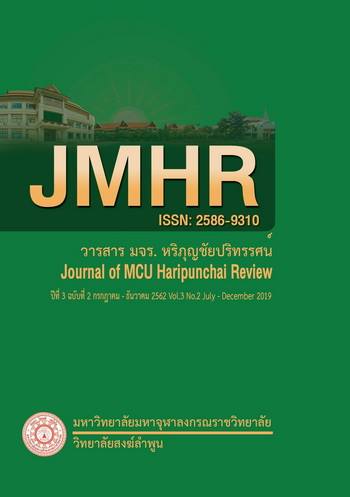การบริหารอำนาจตามแนวพุทธในระบบการปกครองแบบธรรมรัฐ Buddhist administrative powers in A state fair
Main Article Content
Abstract
The study of Buddhist power for the management in this government system Is a way to take care of the state in various fields. The Management of human beings to be fair and orderly Buddhism. It means government for an education it is a rule that causes peace and order from the government Of Pracharat who lives in the land, which has divided by 3 concepts: (1) politics (2) social and (3) economic
"Dharma state" is a rule by the principle that the king and the leader of government must adhere to as a practice. Meanwhile it is to be suitable for being in the modern times, namely, the Principles of Dhamma, Rajabhat 10, Empire12, Rajasangkahavatdu, Object 4, Prejudice 4, it used to be for the leaders and the principles that gathering together in both the same class
As for the principle of the state as a democratic development for Thai society. We can see that for Thai society, there are 3 main problems, namely, civil, political and bureaucracy. The application of democratic tools in Thai society can be applied in 4 ways:
1 Principles of Dharma state is a self-control physical, words and mind in the correct and desirable way of the society
2 Principles of Dharma State Is a self-development, changing or elevation of the mind and behavior. It is to be appropriate and what the democratic society expects
3 Principles of Dharma State is an internal audit tool for people to think, review, and ponder, examine their own behaviors, both past and present, in the framework of the state principle. In order to ensure the correctness, goodness, and birth of one's own life and less mistakes
4 Principles of Dharma State is an external inspection that is the method of examination by external auditors may be other persons or agencies according to the framework. Dharma State are governed by democracy have shown responsibility for what they do
Article Details
References
ไตรรัตน์ จงจิตร,(2546),“การบริหาร-นักบริหาร”,รัฐสภาสาร,ปีที่ 5 ฉบับที่ 5 เดือนพฤษภาคม 2546 :
นฤมล ทับจุมพล, ,(2546), “แนวคิดและวาทกรรมว่าด้วย : ธรรมรัฐแห่งชาติ”,รวมบทความธรรมาภิบาลกับคอรัปชั่นในสังคมไทย.(กรุงเทพมหานคร : สถาบันวิถีทรรศน์
พจนานุกรมฉบับราชบัณฑิตยสถาน พ.ศ. 2542,.
พระธรรมโกศาจารย์, (ประยูร ธมฺมจิตฺโต), (2549) พุทธวิธีบริหาร, (กรุงเทพมหานคร: โรงพิมพ์มหาจุฬาลงกรณราช วิทยาลัย,
พระธรรมปิฎก (ป.อ.ปยุตโต), (2541) ธรรมนูญชีวิต,(กรุงเทพฯ:โรงพิมพ์บริษัท สหธรรมมิก จำกัด,.
__________, (ป.อ.ปยุตฺโต), (2543), กระบวนการเรียนรู้เพื่อพัฒนาคนไปสู่ประชาธิปไตย,(กรุงเทพฯ : โรงพิมพ์มหาจุฬาลงกรณราชวิทยาลัย,
__________, (ป.อ.ปยุตฺโต), ( 2542), ธรรมนูญชีวิต: พุทธจริยธรรมเพื่อชีวิตที่ดีงาม,.
__________, (ป.อ.ปยุตฺโต), (2548), รัฐศาสตร์และจริยธรรมนักการเมืองแนวพุทธ,(กรุงเทพมหานคร: มูล นิธิพุทธธรรม
พระราชญาณวิสิฐ (เสริมชัย ชยมงฺคโล), (2552) หลักธรรมาภิบาลและประมุขสิลป์ : คุณลักษณะความเป็นผู้นำที่ดี,( พิมพ์ครั้งที่ 6, ราชบุรี : มูลนิธิพุทธภาวนาวิชชาธรรมกาย, .
มหาจุฬาลงกรณราชวิทยาลัย, พระไตรปิฎกภาษาไทยฉบับมหาจุฬาฯ แปล, เล่ม 17 พระสุตตันตปิฎก เล่มที่ 9 สังยุตตนิกาย ขันธวารวรรค กรุงเทพฯ : โรงพิมพ์มหาจุฬาลงกรณราชวิทยาลัย, (2535).
ยุค ศรีอาริยะ, “โลกาภิวัตน์ กับ Good Governance” รวมบทความธรรมาภิบาลกับคอรัปชั่นในสังคมไทย, (กรุงเทพมหานคร : สถาบันวิถีทรรศน์,(2546), .
__________, “โลกาภิวัตน์ กับ Good Governance” รวมบทความธรรมาภิบาลกับคอรัปชั่นในสังคมไทย, .
วิโรจน์ สารรัตนะ,(รองศาสตราจารย์ ดร.) การบริหารหลักกา ทฤษฎี และประเด็นทางการศึกษา,(กรุงเทพ มหานคร: โรงพิมพ์ทิพยวิสุทธิ์, (2542), .
อมรา พงศาพิชญ์, “ธรรมรัฐกับประชาสังคม” รวมบทความธรรมาภิบาลกับคอรัปชั่นในสังคมไทย,(กรุงเทพ มหานคร : สถาบันวิถีทรรศน์,(2546), หน้า .
อุทัย หิรัญโต, เทคนิคการบริหาร, (กรุงเทพมหานคร: สำนักพิมพ์โอเดียนสโตร์, (2525),.
Denhardt, Janet V. and Robert B. Denhardt. The New Public Service: Serving, not Steer, New York: M.E. Sharpe, Inc. (2003) .
Boonmi, Thirayuth. Good Governance: A Strategy to Restore Thailand. In Duncan McCargo. (ed.) Reforming Thai Politics.2002.


